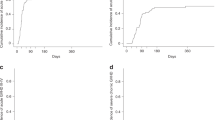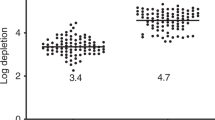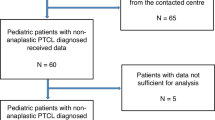Abstract
The role of autologous stem cell transplant (ASCT) in indolent lymphomas is a controversial issue. From 1994 to 1999, we performed ASCT with immunologically purged progenitor cells in 15 patients with advanced stage follicular lymphoma (FL) after early partial or complete remission. Results of the purging strategy and follow-up of minimal residual disease after transplant were analyzed with PCR amplification of bcl-2/IgH rearrangement for the t(14;18) translocation. A comparison of transplanted patients with a group of controls was carried out to evaluate differences in progression-free survival and overall survival. Eighty percent of patients received one chemotherapy regimen before ASCT and were in first remission. All the patients received cyclophosphamide plus hyperfractionated total body irradiation as the conditioning regimen. Nine patients were transplanted with bone marrow (BM) and six with peripheral blood progenitor cells (PBPC). Engraftment was delayed in one patient transplanted with BM. Two patients died during the transplant procedure. Ten of 12 evaluable patients were PCR positive in the BM for bcl-2 rearrangement at diagnosis. Six of them (60%) were still positive after chemotherapy, and one patient was transplanted with a positive hematopoietic product after purging. With a median follow-up of 27 months, six of eight evaluable patients still remain PCR negative in the BM. With a median follow-up of 4.7 years from diagnosis, progression-free survival was 83% (95% CI: 63–100). The risk of disease progression of non-transplanted patients was 19.2 times higher than that of transplanted patients (P = 0.01), but no differences were found in overall survival. Regarding patients in first remission, the risk of relapse was 12.6 times higher in non-transplanted than in transplanted patients (P = 0.04). This procedure seems to offer a good chance to achieve a PCR-negative state and prolonged freedom from recurrence. According to these results, prospective randomized trials are warranted. Bone Marrow Transplantation (2000) 26, 1051–1056.
This is a preview of subscription content, access via your institution
Access options
Subscribe to this journal
Receive 12 print issues and online access
$259.00 per year
only $21.58 per issue
Buy this article
- Purchase on Springer Link
- Instant access to full article PDF
Prices may be subject to local taxes which are calculated during checkout



Similar content being viewed by others
References
Salar A, Fernández de Sevilla A, Romagosa V et al. Distribution and incidence rates of lymphoid neoplasms according to the REAL classification in a single institution. A prospective study of 940 cases Eur J Haematol 1997 59: 231–237
Young RC, Longo DL, Glatstein E et al. The treatment of indolent lymphomas: watchful waiting compared with aggressive combined modality treatment Semin Hematol 1988 25: 11–16
Horning SJ, Rosenberg SA . The natural history of initially untreated low-grade non-Hodgkin's lymphoma New Engl J Med 1984 311: 1471–1475
Price CGA, Rohatiner AZS, Steward W et al. Interferon alfa-2b in addition to chlorambucil in the treatment of follicular lymphoma: preliminary results of a randomized trial in progress Eur J Cancer 1991 27: S34–S36
Arranz R, García-Alfonso P, Sobrini P et al. Role of interferon alfa 2b in the induction and maintenance treatment of low-grade non-Hodgkin's lymphoma: results from a prospective, multicenter trial with double randomization J Clin Oncol 1998 16: 1538–1546
Solal-Cèligny P, Lepage E, Brousse N et al. A doxorubicin-containing regimen with or without interferon alpha-2b for advanced follicular lymphomas: final analysis of survival and toxicity in the GELF 86 trial J Clin Oncol 1998 16: 2332–2338
Redman JR, Cabanillas F, Velasquez WS et al. Phase II trial of fludarabine phosphate in lymphoma: an effective new agent in low-grade lymphoma J Clin Oncol 1992 10: 790–794
Solal-Cèligny P, Brice P, Brousse N et al. Phase II trial of fludarabine monophosphate as first-line treatment in patients with advanced follicular lymphoma: a multicenter study by the Groupe d'Etude des Lymphomes de l'Adulte J Clin Oncol 1996 14: 514–519
McLaughlin P, Hagemeister FB, Romaguera JE et al. Fludarabine, mitoxantrone, and dexamethasone: an effective new regimen for indolent lymphoma trial J Clin Oncol 1996 14: 1262–1268
Hochster H, Oken M, Winter J et al. Prolonged time to progression (TTP) in patients with low-grade lymphoma (LGL) treated with cyclophosphamide (C) and fludarabine (F) Proc ASCO 1998 17: 17a (Abstr. 66)
Maloney DG, Grillo-López AJ, White CA et al. IDEC-C2B8 (rituximab) anti-CD20 monoclonal antibody therapy in patients with relapsed low grade non-Hodgkin's lymphoma Blood 1997 90: 2188–2195
McLaughlin P, Grillo-López AJ, Link BK et al. Rituximab chimeric anti-CD20 monoclonal antibody therapy for relapsed indolent lymphoma: half of patients respond to a four-dose treatment program J Clin Oncol 1998 16: 2825–2833
Czuczman MS, Grillo-López AJ, White CA et al. Treatment of patients with low-grade B-cell lymphoma with the combination of chimeric anti-CD20 monoclonal antibody and CHOP chemotherapy J Clin Oncol 1999 17: 268–276
Philip T, Guglielmi C, Hagenbeek A et al. Autologous bone marrow transplantation as compared with salvage chemotherapy in relapses of chemotherapy sensitive non-Hodgkin's lymphoma New Engl J Med 1995 333: 1540–1545
Schouten HC, Bierman PJ, Vaughan WP et al. Autologous bone marrow transplantation in follicular non-Hodgkin's lymphoma before and after histologic transformation Blood 1989 74: 2579–2584
Brenner M, Rill D, Moen R et al. Gene-marking to trace origin of relapse after autologous bone-marrow transplantation Lancet 1993 341: 85–86
Cleary ML, Smith SD, Sklar J . Cloning and structural analysis of cDNAs for bcl-2 and a hybrid bcl-2 immunoglobulin transcript resulting from the t(14;18) translocation Cell 1986 47: 19–28
Martín-Henao GA, Picón M, Limón A et al. Immunomagnetic bone marrow (BM) and peripheral blood progenitor cell (PBPC) purging in follicular lymphoma (FL) Bone Marrow Transplant 1999 23: 579–587
Sambrook J, Fritsch EF, Maniatis T . Molecular Cloning: a Laboratory Manual Cold Spring Harbor Laboratory: Cold Spring Harbor, NY 1989
Gribben JG, Freedman AS, Woo SD et al. All advanced stage non-Hodgkin's lymphomas with a polymerase chain reaction amplifiable bcl-2 translocation have residual cells containing the bcl-2 rearrangement at evaluation and following treatment Blood 1991 78: 3275–3280
Gribben JG, Freedman AS, Neuberg D et al. Immunologic purging of marrow assessed by PCR before autologous bone marrow transplantation for B-cell lymphoma New Engl J Med 1991 325: 1525–1533
Gribben JG, Neuberg D, Freedman AS et al. Detection by polymerase chain reaction of residual cells with the bcl-2 translocation is associated with increased risk of relapse after autologous bone marrow transplantation for B-cell lymphoma Blood 1993 81: 3449–3457
Freedman AS, Gribben JG, Neuberg D et al. High-dose therapy and autologous bone marrow transplantation in patients with follicular lymphoma during first remission Blood 1996 88: 2780–2786
Zwicky CS, Maddocks AB, Andersen N, Gribben JG . Eradication of polymerase chain reaction detectable immunoglobulin gene rearrangement in non-Hodgkin's lymphoma is associated with decreased relapse after autologous bone marrow transplantation Blood 1996 88: 3314–3322
Lopez-Guillermo A, Cabanillas F, McLaughlin P et al. The clinical significance of molecular response in indolent follicular lymphomas Blood 1998 91: 2955–2960
Bierman P, Vose J, Anderson J et al. High-dose therapy with autologous hematopoietic rescue for follicular low-grade non-Hodgkin's lymphoma J Clin Oncol 1997 15: 445–450
Bastion Y, Brice P, Haioun C et al. Intensive therapy with peripheral blood progenitor cell transplantation in 60 patients with poor prognosis follicular lymphoma Blood 1995 86: 3257–3262
Rohatiner A, Johnson P, Price C et al. Myeloablative therapy with autologous bone marrow transplantation as consolidation therapy for recurrent follicular lymphoma J Clin Oncol 1994 12: 1177–1184
Hass R, Moos M, Múhle R et al. High-dose therapy with peripheral blood progenitor cell transplantation in low-grade non-Hodgkin's lymphoma Bone Marrow Transplant 1996 17: 149–155
Bearman SI, Appelbaum FR, Buckner CD et al. Regimen-related toxicity in patients undergoing bone marrow transplantation J Clin Oncol 1988 6: 1562–1568
Stone RM, Neuberg D, Soiffer R et al. Myelodysplastic syndrome as a late complication following autologous bone marrow transplantation for non-Hodgkin's lymphoma J Clin Oncol 1994 12: 2535–2542
Author information
Authors and Affiliations
Rights and permissions
About this article
Cite this article
González-Barca, E., Fernández de Sevilla, A., Domingo-Claros, A. et al. Autologous stem cell transplantation (ASCT) with immunologically purged progenitor cells in patients with advanced stage follicular lymphoma after early partial or complete remission: toxicity, follow-up of minimal residual disease and survival. Bone Marrow Transplant 26, 1051–1056 (2000). https://doi.org/10.1038/sj.bmt.1702660
Received:
Accepted:
Published:
Issue Date:
DOI: https://doi.org/10.1038/sj.bmt.1702660
Keywords
This article is cited by
-
The role of stem cell transplantation in the management of relapsed follicular lymphoma in the era of targeted therapies
Bone Marrow Transplantation (2019)
-
Stem cell transplantation in follicular lymphoma: progress at last?
Bone Marrow Transplantation (2004)
-
The role of molecular monitoring in autotransplantation for non-Hodgkin's lymphoma
Bone Marrow Transplantation (2002)



